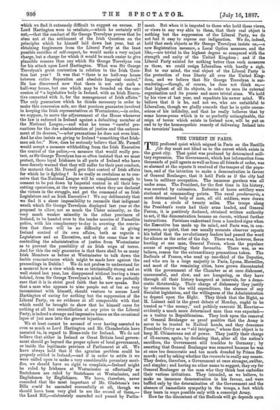THE UNREST IN PARIS.
THE profound quiet which reigned in Paris on the Bastille fete day must not blind us to the unrest which exists in the great city. That quiet was produced by determined mili- tary repression. The Government, which has information from thousands of paid agents as well as from all friends of order, was so alarmed at the reports it received of the temper of the popu- lace, and of the intention to make a demonstration in favour of General Boulanger, that it held Paris as if the city had been in military occupation. The immense garrison was all under arms. The President, for the first time in his history, was escorted by cuirassiers. Batteries of horse artillery were stationed at commanding points. The rural gendarmerie, a most determined body of men, all old soldiers, were drawn in from a circle of twenty miles. The troops along the President's route had their arms loaded, and General Perron, it is positively declared, obtained written authority to act, if the demonstration became an imeute, without further instructions. Parisians understand from a hundred signs when the Executive has made up its mind, and Paris was, in con- sequence, so quiet, that one usually accurate observer reports his belief that the revolutionary leaders had passed the word for silence as the order of the day. There was, hoWever, fierce hooting at one man, General Perron, whom the populace accuse of superseding their favourite. There was, as we believe, reason for the extraordinary precautions taken. The Radicals of France, who send up one-third of the Deputies, and who are in a large majority in Paris, Lyons, Marseilles, and most of the remaining cities, have grown discontented with the government of the Chamber as at once dishonest, unsuccessful, and slow, and are hungering, as they have through all their history hungered at intervals, for a demo- cratic dictatorship. Their charge of dishonesty they justify by references to the wild expenditure, the absence of any Socialist legislation, and the willingness of the Administration to depend upon the Right. They think that the Right, as M. Laisant said in the great debate of Monday, ought to be treated as " the enemy," and publicly execrate M. Rouvier- evidently a much more determined man than was expected— as a traitor to Republicanism. They look upon the removal of General Boulanger as proof positive that the Army is never to be trusted to Radical hands, and they denounce President Grevy as an "old intriguer," whose first object is to keep M. CldMenceau out of power. They justify their charge of ill-success, again, by declaring that, after all the nation's sacrifices, the Government still truckles to Germany ; by asserting that General Boulanger was removed because he was at once too democratic and too much dreaded by Prince Bis- marck; and by asking whether the revanche is really any nearer. They desire, therefore, a Government at once stronger, swifter, and simpler; and having no other name to suggest, they cry for General Boulanger as the man who they think best embodies their various irritations. They intended, as we believe, to make an immense demonstration in his favour, and were baffled only by the determination of the Government and the absence of immediate sympathy in the troops, a fact which they learn in ways possible only with a conscript Army.
How far the discontent of the Radicals will go depends upon























































 Previous page
Previous page